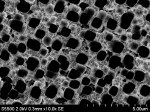Month: October 2010
-
Indian Biotech Develops Cell-Culture H1N1 Vaccine
Bharat Biotech in Hyderabad, India said today it developed India’s first cell-culture H1N1 swine flu vaccine. The company believes it is the only developing world flu vaccine to be manufactured in cell culture, a faster and more advanced manufacturing process, instead of eggs. Traditional egg-based flu vaccine production requires long lead times — four to…
-
Sanofi-aventis, Harvard to Collaborate on Biomedical Research
Sanofi-aventis, a global pharmaceutical company headquartered in Paris, and Harvard University in Cambridge, Massachusetts said today they established a collaboration to conduct basic and applied research in human health and promote scientific exchange between their organizations. The collaboration will focus on translational biomedical research in therapies for conditions such as cancer, diabetes and inflammation. Under…
-
Analysis of Patient Records Shows Results of H5N1 Flu Drug
An analysis of clinical records stored in a registry of patients from various countries who contracted the influenza A/H5N1 (Avian flu) virus, shows that treatment with the drug oseltamivir reduces mortality in patients with the disease, even when given late in the course of illness. The findings were published in the Journal of Infectious Diseases.…
-
Advanced Statistical Analysis Enables Food Bacteria Detection
Finding bacterial contamination in the food supply when the target contaminants are known is difficult enough, but finding food-borne bacteria that are not identified targets can seem like an overwhelming task. To attack this problem, researchers from Indiana University-Purdue University Indianapolis (IUPUI) and Purdue University in West Lafayette, Indiana have developed a new approach to…
-
Venture Funding Down for Science Startups in Q3 2010
Venture capital (VC) funding in the U.S. for new companies overall, including science-based enterprises, dropped in the third quarter of 2010, according to a new MoneyTree Report from PricewaterhouseCoopers and the National Venture Capital Association based on data provided by Thomson Reuters. Overall, VC companies invested $4.8 billion in 780 deals in the third quarter…
-
FDA Clearance Given for Catheter, Spinal Tap Devices
Mirador Biomedical, a medical device developer in Seattle, Washington, says that the U.S. Food and Drug Administration (FDA) has given 510(k) clearance for two of its products. A 510(k) clearance is required from FDA to market medical devices, where the manufacturers need to demonstrate the safety and effectiveness of the devices. The Compass Vascular Access,…
-
Report: Loose Governance in Oil Company/University Agreements
The Center for American Progress (CAP), a progressive issues analysis organization in Washington, DC, reviewed 10 agreements between universities in the U.S. and oil companies where the companies offer to fund energy research, particularly in alternative fuels. The report finds several areas where the agreements have the potential to compromise academic freedom and limit the…
-
FDA Approves Subcutaneous Delivery of Immunodeficiency Drug
Talecris Biotherapeutics, a biotechnology company in Research Triangle Park, North Carolina said today that the U.S. Food and Drug Administration (FDA) approved its Gamunex-C drug for subcutaneous administration in the treatment of primary immunodeficiency (PI). Subcutaneous administration — illustrated right — delivers the product under the skin into the subcutaneous tissue and intravenous administration is…
-
Early Success Recorded with Lasers on Kidney, Liver Tumors
Physicians at Mayo Clinic’s Jacksonville, Florida campus used a technique known as MRI-guided laser ablation to heat up and destroy kidney and liver tumors. So far, five patients have been successfully treated, which means no visible tumors remained after the procedure. The physicians say the developmental-stage treatment is potentially beneficial against most tumors in the…
-

Univ/Corp Team Extends Lithium-Ion Capacity with Silicon
A team of scientists from Rice University and Lockheed Martin in Houston, Texas has discovered a way to use nanotechnology with silicon to increase the capacity of lithium-ion material in batteries. Research by Sibani Lisa Biswal and Michael Wong, on the chemical and biomolecular engineering faculties at Rice, and Steven Sinsabaugh, a Lockheed Martin Fellow,…
You must be logged in to post a comment.